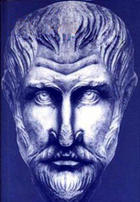
Born in 412 in Constantinople, in a rich family of Lycian origin, he studied rhetoric in Alexandria for the purpose of pursuing his father's jurist's career. The discovery of the philosophical vocation will make him return there soon to study philosophy and mathematics. In 430-431 he goes to Athens attracted by the thriving Platonic school. He studied with teachers like Plutarch or Sirian, whom he happens to be the head of the Academy, until his own death in 485. His disciple and successor, Marino de Neápolis, is the author of Proclus or of happiness, a compliment of his life and teachings. Among the preserved works of Proclus are his five comments on Plato (Alcibiades, Cratylus, Republic, Timaeus and Parmenides), the Elements of Physics and the imposing Platonic Theology.




